课文全文翻译参考译文u2
- 格式:doc
- 大小:42.00 KB
- 文档页数:4

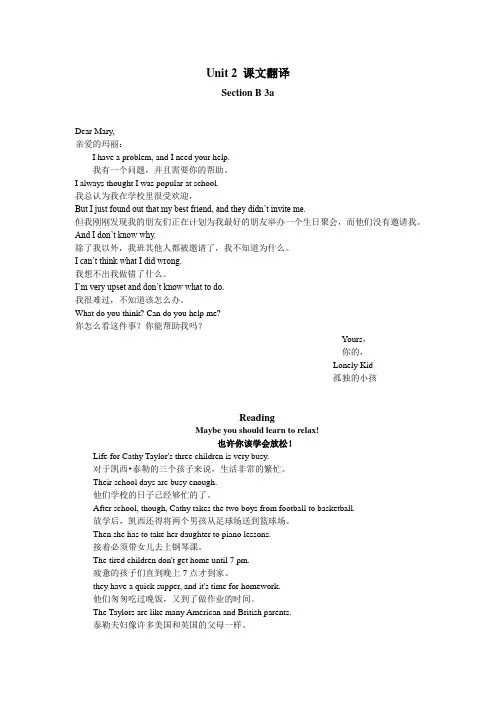
Unit 2 课文翻译Section B 3aDear Mary,亲爱的玛丽:I have a problem, and I need your help.我有一个问题,并且需要你的帮助。
I always thought I was popular at school.我总认为我在学校里很受欢迎,But I just found out that my best friend, and they didn’t invite me.但我刚刚发现我的朋友们正在计划为我最好的朋友举办一个生日聚会,而他们没有邀请我。
And I don’t know why.除了我以外,我班其他人都被邀请了,我不知道为什么。
I can’t think what I did wrong.我想不出我做错了什么。
I’m very upset and don’t know what to do.我很难过,不知道该怎么办。
What do you think? Can do you help me?你怎么看这件事?你能帮助我吗?Yours,你的,Lonely Kid孤独的小孩ReadingMaybe you should learn to relax!也许你该学会放松!Life for Cathy Taylor's three children is very busy.对于凯西•泰勒的三个孩子来说,生活非常的繁忙。
Their school days are busy enough.他们学校的日子已经够忙的了。
After school, though, Cathy takes the two boys from football to basketball.放学后,凯西还得将两个男孩从足球场送到篮球场。
Then she has to take her daughter to piano lessons.接着必须带女儿去上钢琴课。
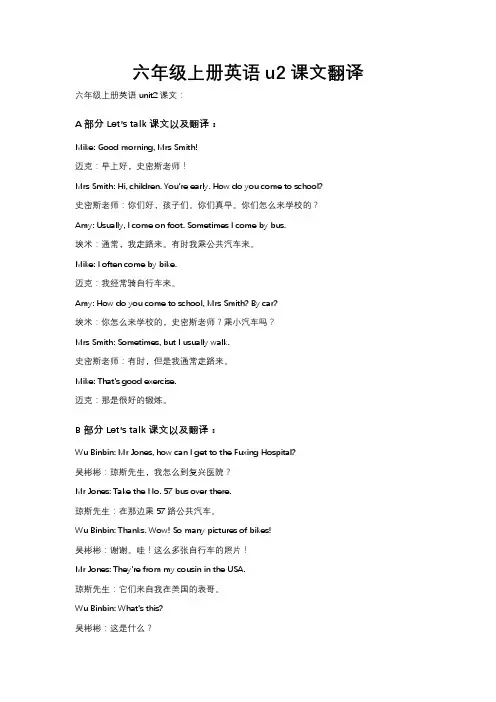
六年级上册英语u2课文翻译六年级上册英语unit2课文:A部分Let’s talk课文以及翻译:Mike: Good morning, Mrs Smith!迈克:早上好,史密斯老师!Mrs Smith: Hi, children. You’re early. How do you come to school?史密斯老师:你们好,孩子们。
你们真早。
你们怎么来学校的?Amy: Usually, I come on foot. Sometimes I come by bus.埃米:通常,我走路来。
有时我乘公共汽车来。
Mike: I often come by bike.迈克:我经常骑自行车来。
Amy: How do you come to school, Mrs Smith? By car?埃米:你怎么来学校的,史密斯老师?乘小汽车吗?Mrs Smith: Sometimes, but I usually walk.史密斯老师:有时,但是我通常走路来。
Mike: That’s good exercise.迈克:那是很好的锻炼。
B部分Let’s talk课文以及翻译:Wu Binbin: Mr Jones, how can I get to the Fuxing Hospital?吴彬彬:琼斯先生,我怎么到复兴医院?Mr Jones: Take the No. 57 bus over there.琼斯先生:在那边乘57路公共汽车。
Wu Binbin: Thanks. Wow! So many pictures of bikes!吴彬彬:谢谢。
哇!这么多张自行车的照片!Mr Jones: They’re from my cousin in the USA.琼斯先生:它们来自我在美国的表哥。
Wu Binbin: What’s this?吴彬彬:这是什么?Mr Jones: A helmet. In the USA people on bikes must wear one.琼斯先生:一个头盔。
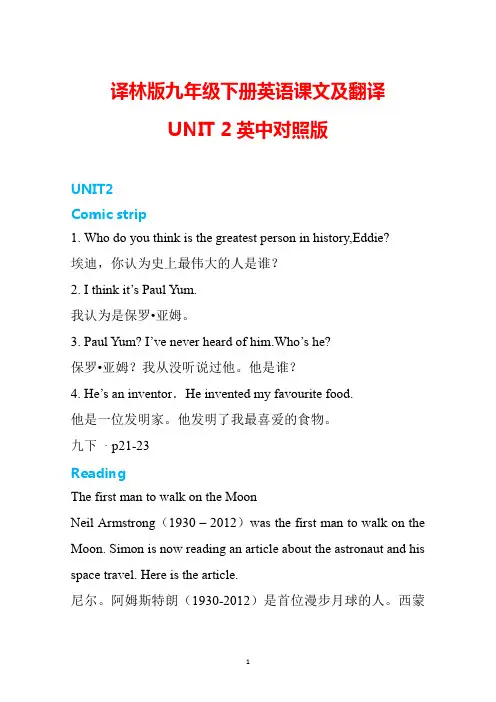
译林版九年级下册英语课文及翻译UNIT 2英中对照版UNIT2Comic strip1. Who do you think is the greatest person in history,Eddie?埃迪,你认为史上最伟大的人是谁?2. I think it’s Paul Yum.我认为是保罗•亚姆。
3. Paul Yum? I’ve never heard of him.Who’s he?保罗•亚姆?我从没听说过他。
他是谁?4. He’s an inventor.He invented my favourite food.他是一位发明家。
他发明了我最喜爱的食物。
九下· p21-23ReadingThe first man to walk on the MoonNeil Armstrong(1930 – 2012)was the first man to walk on the Moon. Simon is now reading an article about the astronaut and his space travel. Here is the article.尼尔。
阿姆斯特朗(1930-2012)是首位漫步月球的人。
西蒙现在正在阅读一篇关于这位宇航员和他的太空旅行的文章。
这是那篇文章。
NEIL ARMSTRONG尼尔•阿姆斯特朗Neil Armstrong was born on 5 August 1930 in Ohio,the USA. He became interestedin flying when he took his first flight at the age of six, He received his student pilot’s licence when he was 16.尼尔•阿姆斯特朗于1930年8月5日出生于美国俄亥俄州。
在他6岁参加第一次飞行时,他就开始对飞行感兴趣。
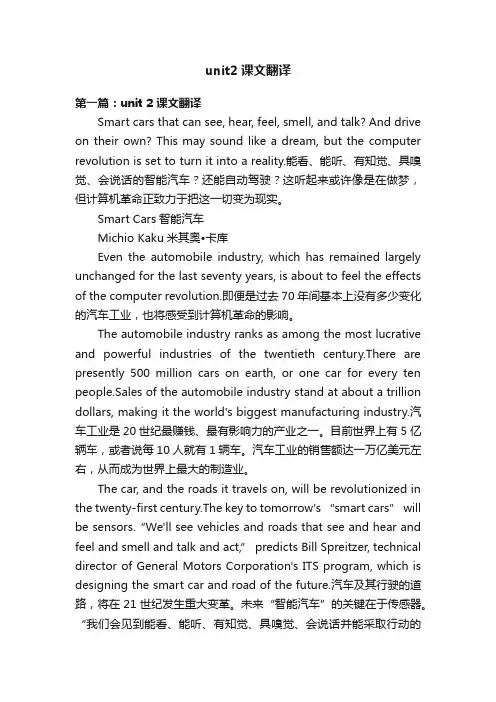
unit2课文翻译第一篇:unit 2 课文翻译Smart cars that can see, hear, feel, smell, and talk? And drive on their own? This may sound like a dream, but the computer revolution is set to turn it into a reality.能看、能听、有知觉、具嗅觉、会说话的智能汽车?还能自动驾驶?这听起来或许像是在做梦,但计算机革命正致力于把这一切变为现实。
Smart Cars智能汽车Michio Kaku米其奥•卡库Even the automobile industry, which has remained largely unchanged for the last seventy years, is about to feel the effects of the computer revolution.即便是过去70年间基本上没有多少变化的汽车工业,也将感受到计算机革命的影响。
The automobile industry ranks as among the most lucrative and powerful industries of the twentieth century.There are presently 500 million cars on earth, or one car for every ten people.Sales of the automobile industry stand at about a trillion dollars, making it the world's biggest manufacturing industry.汽车工业是20世纪最赚钱、最有影响力的产业之一。
目前世界上有5亿辆车,或者说每10人就有1辆车。
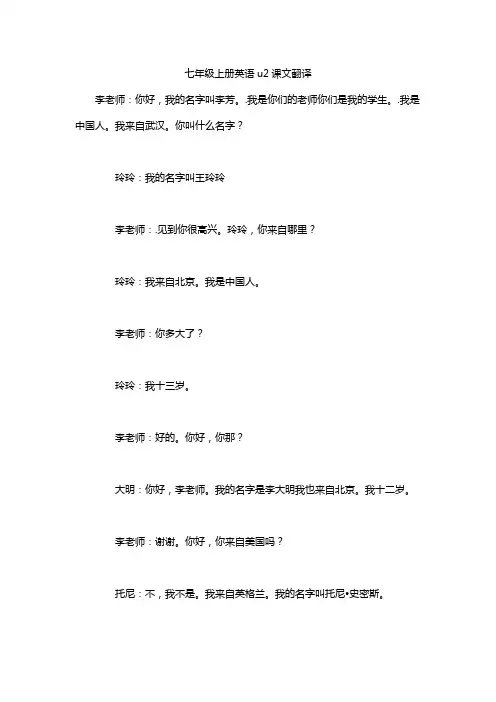
七年级上册英语u2课文翻译李老师:你好,我的名字叫李芳。
.我是你们的老师你们是我的学生。
.我是中国人。
我来自武汉。
你叫什么名字?玲玲:我的名字叫王玲玲李老师:.见到你很高兴。
玲玲,你来自哪里?玲玲:我来自北京。
我是中国人。
李老师:你多大了?玲玲:我十三岁。
李老师:好的。
你好,你那?大明:你好,李老师。
我的名字是李大明我也来自北京。
我十二岁。
李老师:谢谢。
你好,你来自美国吗?托尼:不,我不是。
我来自英格兰。
我的名字叫托尼•史密斯。
李老师:见到你很高兴。
托尼。
嗨,你也是英国人吗?贝蒂:不,我不是。
我是美国人。
我的名字叫贝蒂•金。
玲玲:托尼和贝蒂是我们的朋友。
李老师:好的。
欢迎来到七年级四班。
M1U2大家好。
我叫李大明,我的英文名字叫戴维。
我12岁,我来自北京。
北京是中国的首都。
这是玲玲,她的英文名字叫露西。
她是我的朋友。
她也来自北京。
你们好。
我叫王玲玲,我13岁。
很高兴见到你。
王辉是我的朋友,但他不在我们班。
他的英文名字叫亨利。
他来自上海。
上海是个很大的城市。
你们好,我的名字叫托尼•史密斯。
我来自剑桥。
他在英国是个小城市。
托尼是我的名字,史密斯是我的姓。
我13岁。
很高兴见到你们所有的人。
M2U1玲玲:这是你的家庭吗?托尼:是的,它是。
玲玲:好大的一个家庭啊!这是你的妹妹吗?托尼:是的,这是她。
她叫琳达。
玲玲:这些人是你的祖父母和外祖父母吗?托尼:是的,他们是。
我妈妈的父母在左边,我爸爸的父母在右边。
玲玲:我明白了。
这是谁?托尼:那是我爸爸。
玲玲:这是你的妈妈吗?托尼:是的。
在她旁边的妇女是我爸爸的姐姐,我的姑姑利兹。
玲玲:这是她的丈夫吗?托尼:不,那是她的兄弟,我的叔叔保罗。
玲玲:在保罗前面的男孩和女孩是谁?托尼:那是保罗的儿子和女儿,我的堂兄妹迈克和海伦。
M2U2我叫贝蒂·金。
这是我的父母。
我们是美国人。
我爸爸是一名男演员,我妈妈是一家剧院的经理我叫李大明这是我的父母。
我们是中国人。
我爸爸在警察局工作。

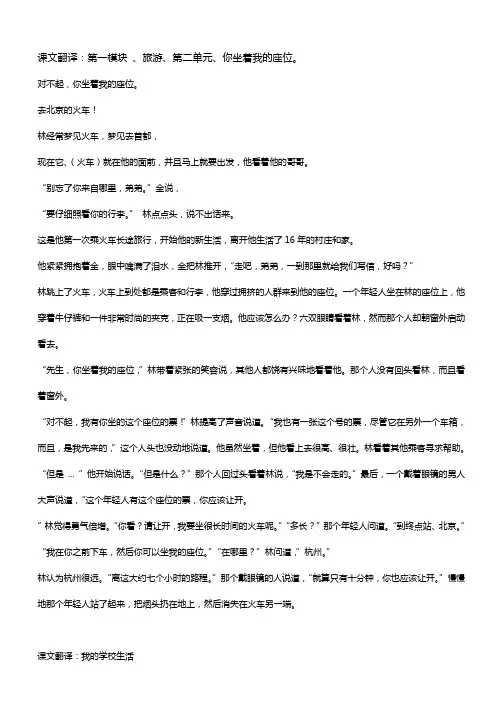
课文翻译:第一模块、旅游、第二单元、你坐着我的座位。
对不起,你坐着我的座位。
去北京的火车!林经常梦见火车,梦见去首都,现在它、(火车)就在他的面前,并且马上就要出发,他看着他的哥哥。
“别忘了你来自哪里,弟弟。
”金说,“要仔细照看你的行李。
”林点点头,说不出话来。
这是他第一次乘火车长途旅行,开始他的新生活,离开他生活了16年的村庄和家。
他紧紧拥抱着金,眼中噙满了泪水,金把林推开,“走吧,弟弟,一到那里就给我们写信,好吗?”林跳上了火车,火车上到处都是乘客和行李,他穿过拥挤的人群来到他的座位。
一个年轻人坐在林的座位上,他穿着牛仔裤和一件非常时尚的夹克,正在吸一支烟。
他应该怎么办?六双眼睛看着林,然而那个人却朝窗外启动看去。
“先生,你坐着我的座位,”林带着紧张的笑容说,其他人都饶有兴味地看着他。
那个人没有回头看林,而且看着窗外。
“对不起,我有你坐的这个座位的票!”林提高了声音说道。
“我也有一张这个号的票,尽管它在另外一个车箱,而且,是我先来的,”这个人头也没动地说道。
他虽然坐着,但他看上去很高、很壮。
林看着其他乘客寻求帮助。
“但是 ... ”他开始说话。
“但是什么?”那个人回过头看着林说,“我是不会走的。
”最后,一个戴着眼镜的男人大声说道,“这个年轻人有这个座位的票,你应该让开。
”林觉得勇气倍增。
“你看?请让开,我要坐很长时间的火车呢。
”“多长?”那个年轻人问道。
“到终点站、北京。
”“我在你之前下车,然后你可以坐我的座位。
”“在哪里?”林问道,”杭州。
”林认为杭州很远。
“离这大约七个小时的路程。
”那个戴眼镜的人说道,“就算只有十分钟,你也应该让开。
”慢慢地那个年轻人站了起来,把烟头扔在地上,然后消失在火车另一端。
课文翻译:我的学校生活我的名字是萨利、马克斯韦尔,今年15岁。
从我11岁起,我就在伦敦的帕克学校读书。
如果我明年通过了考试,我将在这里待到18岁。
帕克学校是一所中学,从我家骑自行车到学校大约要20分钟。
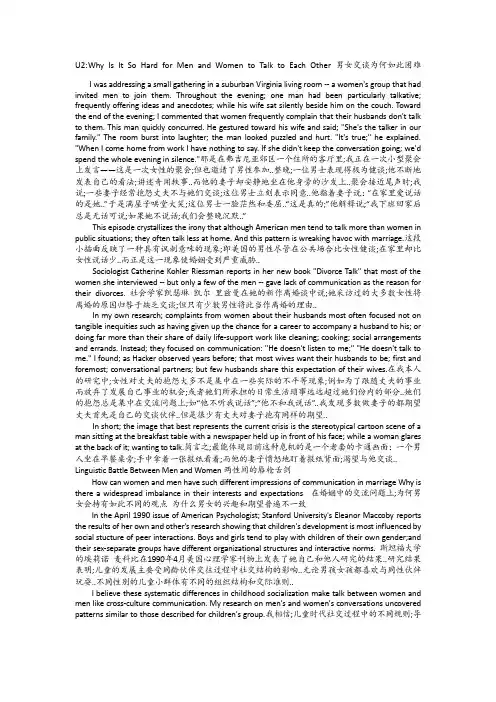
U2:Why Is It So Hard for Men and Women to Talk to Each Other 男女交谈为何如此困难I was addressing a small gathering in a suburban Virginia living room -- a women's group that had invited men to join them. Throughout the evening; one man had been particularly talkative; frequently offering ideas and anecdotes; while his wife sat silently beside him on the couch. Toward the end of the evening; I commented that women frequently complain that their husbands don't talk to them. This man quickly concurred. He gestured toward his wife and said; "She's the talker in our family." The room burst into laughter; the man looked puzzled and hurt. "It's true;" he explained. "When I come home from work I have nothing to say. If she didn't keep the conversation going; we'd spend the whole evening in silence."那是在弗吉尼亚郊区一个住所的客厅里;我正在一次小型聚会上发言——这是一次女性的聚会;但也邀请了男性参加..整晚;一位男士表现得极为健谈;他不断地发表自己的看法;讲述奇闻轶事..而他的妻子却安静地坐在他身旁的沙发上..聚会接近尾声时;我说;一些妻子经常抱怨丈夫不与她们交谈;这位男士立刻表示同意..他指着妻子说:“在家里爱说话的是她..”于是满屋子哄堂大笑;这位男士一脸茫然和委屈..“这是真的;”他解释说;“我下班回家后总是无话可说;如果她不说话;我们会整晚沉默..”This episode crystallizes the irony that although American men tend to talk more than women in public situations; they often talk less at home. And this pattern is wreaking havoc with marriage.这段小插曲反映了一种具有讽刺意味的现象;即美国的男性尽管在公共场合比女性健谈;在家里却比女性说话少..而正是这一现象使婚姻受到严重威胁..Sociologist Catherine Kohler Riessman reports in her new book "Divorce Talk" that most of the women she interviewed -- but only a few of the men -- gave lack of communication as the reason for their divorces. 社会学家凯瑟琳凯尔里兹曼在她的新作离婚谈中说;她采访过的大多数女性将离婚的原因归咎于缺乏交谈;但只有少数男性将此当作离婚的理由..In my own research; complaints from women about their husbands most often focused not on tangible inequities such as having given up the chance for a career to accompany a husband to his; or doing far more than their share of daily life-support work like cleaning; cooking; social arrangements and errands. Instead; they focused on communication: "He doesn't listen to me;" "He doesn't talk to me." I found; as Hacker observed years before; that most wives want their husbands to be; first and foremost; conversational partners; but few husbands share this expectation of their wives.在我本人的研究中;女性对丈夫的抱怨大多不是集中在一些实际的不平等现象;例如为了跟随丈夫的事业而放弃了发展自己事业的机会;或者她们所承担的日常生活琐事远远超过她们份内的部分..她们的抱怨总是集中在交流问题上;如“他不听我说话”;“他不和我说话”..我发现多数做妻子的都期望丈夫首先是自己的交谈伙伴..但是很少有丈夫对妻子抱有同样的期望..In short; the image that best represents the current crisis is the stereotypical cartoon scene of a man sitting at the breakfast table with a newspaper held up in front of his face; while a woman glares at the back of it; wanting to talk.简言之;最能体现目前这种危机的是一个老套的卡通画面:一个男人坐在早餐桌旁;手中拿着一张报纸看着;而他的妻子愤怒地盯着报纸背面;渴望与他交谈.. Linguistic Battle Between Men and Women两性间的唇枪舌剑How can women and men have such different impressions of communication in marriage Why is there a widespread imbalance in their interests and expectations 在婚姻中的交流问题上;为何男女会持有如此不同的观点为什么男女的兴趣和期望普遍不一致In the April 1990 issue of American Psychologist; Stanford University's Eleanor Maccoby reports the results of her own and other's research showing that children's development is most influenced by social stucture of peer interactions. Boys and girls tend to play with children of their own gender;and their sex-separate groups have different organizational structures and interactive norms. 斯坦福大学的埃莉诺麦科比在1990年4月美国心理学家刊物上发表了她自己和他人研究的结果..研究结果表明;儿童的发展主要受同龄伙伴交往过程中社交结构的影响..无论男孩女孩都喜欢与同性伙伴玩耍..不同性别的儿童小群体有不同的组织结构和交际准则..I believe these systematic differences in childhood socialization make talk between women and men like cross-culture communication. My research on men's and women's conversations uncovered patterns similar to those described for children's group.我相信;儿童时代社交过程中的不同规则;导致了两性间的交谈如同跨文化交流一样难..我本人通过对男女对话的研究发现;成年男女对话的模式类似于儿童群体交流过程中的模式..For women; as for girls; intimacy is the fabric of relationships; and talk is the thread from which it is woven. little girls creat and maintain friendship by exchanging secrets;similarly;women regard conversation as the cornerstoneof friendship. So a woman expects her husband to be a new and improved version of a best friend. What is important is not the individual subjects that are discussed but the sense of closeness;of a life shared;that emerges when people tell their thoughts;feelings;and impressions. 成年女性同女孩一样;彼此亲密是她们感情关系的纽带..而交谈是编织这种纽带的线..小女孩通过相互交换秘密来建立和维持友谊..同样;成年女性也把交谈看作友谊的基础..因此;女性期望丈夫成为自己新的、更好的知心朋友..对她们来说重要的不是某个具体的讨论话题;而是在说出自己的想法、感受和印象时所表现出来的那种亲密的、分享生活的感觉..Bonds between boys can be as intense as girls'; but they are based less on talking; more on doing things together. Since they don't assume talk is the cement that binds a relationship; men don't know what kind of talk women want; and they don't miss it when it isn't there. 男孩间的关系和女孩一样紧密..但男孩间的关系与其说建立在交谈基础上;不如说建立在共同动手基础上..既然他们不认为交谈能够巩固感情关系;他们不知道女人需要何种交谈;也不会因为没有交谈而感到遗憾..Boys' group are larger; more inclusive; and more hierachical; so boys must struggle to avoid the subordinate position in the group. This may play a role in women's complaints that men don't listen to them. 男孩的群体比女孩的要大;所包括的人更广泛; 也更具有等级特色..因此;男孩们势必要努力争取不在群体中处于从属地位..这也许是为什么女人抱怨男人不听她们说话的根源之一..Often when women tell men;"You aren't listening."and men protest "I am";the man are right. The impression of not listening results from misalignments in the mechanics of conversation.This misalignment begins as soon as a man and a woman take physical position. When I studied videotapes made by psychologist Bruce Dorval of children and adults taking to their same-sex best friends;I found at every age;the girls and women faced each other directly;their eyes anchored on each other's face. At every age;the boys and men sat at angles to each other and looked elsewhere in the room;perildically glancing at each other. But the tendency of men to face away can give women the impression they aren't listening even when they are.A young woman in college was frustrated:whenever she told her boyfriend she wanted to talk to him;he would lie down on the floor;close his eyes;and put his arm over his face. This signaled to her;"He's taking a nap."But he insisted he was listening extra hard. Normally;He looks around the room;so he is easily distracted. Lying down and covering his eyes helped him concentrate on what she was saying.当女的对男的说“你没有在听”;而男的反对说“我在听”时;常常男的是对的..这种给人没有在听的印象是由于男女对话方式的不同而引起的..这种不同在男女各自就位时就已表现出来了..我对心理学家布鲁斯多维尔录制的关于儿童与成人分别与他们的同性好友交谈时的录像带进行了研究..研究发现;无论多大年龄的女孩和成年女性;都采取面对面的姿势;眼睛看着对方的脸..而各种年龄的男孩和成年男子就座时;相互位置都成一定的角度;眼睛看着屋子别的地方;只有时不时瞥对方一眼..男性这种看着别处的习惯;可能给女性一种印象;那就是他们没有在听;即使他们在听也会给人以没有在听的印象..一个年轻的女大学生感到很失望;因为每当她告诉男朋友她想跟他谈谈时;他总是躺在地上;闭上眼睛;并用手臂挡住脸..她对此的理解是;“他想睡一会儿”..而他则坚持说他在非常认真地倾听..在一般情况下;他会环顾屋子四周;所以容易分心..而躺在地上;蒙住眼睛会使他专心致志听女友说话..Swiching topics is another habit that gives women the impression men aren't listening especially if they swich to a topic about themselves. The girls in my study tended to talk at length about one topic;but the boys tended to jump from topic to topic. 转移话题是男人的另一种习惯;这种习惯也给女人一个印象:他们没有在听..特别是当他们把话题转移到自己身上时更是如此..在我的研究中;女孩往往就一个话题谈得很详细;而男孩倾向于不断改变话题..My study of the 10th-grade children found that when a girl told a friend about a problem;the friend responded by asking probing questions and expressing agreement and understanding.But the boys dismissed each other's problems. Tldd assured Richard that his drinking was "no big problem".And when Todd said he felt left out;Richard responded;"Why should you You know more people than me." 我对10年级的孩子所进行的研究发现;当女孩对朋友倾诉烦恼时;对方总是刨根问底;并且表示同意和理解..男孩却不把对方的问题看得那么严重..例如;托德安慰理查德说他饮酒“不是什么大问题”..当托德说他遭受冷落时;理查德回答说:“你怎么会这么想你认识的人比我还多..”Women perceived such responses as belittling and unsupportive.But the boys seemed satisfied with them.Whereas women reassure each by implying;"You shouldn't feel bad because I've had similar experiences;"men do so by implying;"You shouldn't feel bad because your problems aren't so bad." 女性把这种回答看作是轻视她们的问题和不支持她们..但男性似乎对这种回答很满意..女性的回答暗示:“你不应该感到难过;因为我也有过类似的经历;”从而彼此安慰..而男性通过暗示“你不应该感到难过;因为你的问题并不那么糟糕”来彼此安慰..There are even simpler reasons for women's impression that men don't listen. Linguist Lynette Hirschman found that women make more listener-noise; such as "mhm";"uhuh";and "yeah";to show "I'm with you". Men; she found; more often give silent attention. Women who expect a stream of listener-noise interpret silent attention as no attention at all.还有更简单的原因来解释为什么女人总觉得男人没有在听..语言学家莱内特赫希曼发现;女性比男性发出更多的倾听者的声音;如“对”;“嗯嗯”;“是”等来表示“我理解”..她发现;男人通常是静静地倾听..而女人期待听到一连串倾听者的声音;她们把静静地听理解为根本没有注意听..Women's conversational habits are as frustrating to men as men's are to women. Men who expect silent attention interpret a stream of listener-noise as overreaction or impatience. Also;when women talk to each other in a close; domfortable setting;they often overlap;finish each other's sentences and anticipate what the other is about to say. This practice;which I call "participatory listenership"; is often perceived by men as interruption;intusion and lack of attention. 男性的对话习惯使女性感到失望;同样;女性的对话习惯也使男性感到失望..男性期望的是静静地注意听;他们将一连串倾听者的声音理解为过头的反应或是不耐烦..此外;当女性在一个亲密、舒适的环境里交谈时;常常互相搭话;说完对方未说完的句子;并且能够预料到对方要说什么..我把这种做法叫做“参与式倾听”;男性往往将此理解为干扰、冒犯和缺乏注意力..A parallel difference caused a man to complain about his wife;"She just wants to talk about her own point of view.If I show her another view;she gets mad at me."When most women talk to each other; they assume a conversationalist's job is to express agreement and support.But many men see their conversational duty as pointing out the other side of an argument. This is heard as disloyalty by women; and refusal to offer the requisite support.It is not that women don't want to see other points of view;but that they prefer them phrased as suggestions and inquiries rather than as direct challenges. 同样;男女之间的差别也使丈夫抱怨妻子;“她只想表达她的观点..如果我向她表达另一种不同的观点;她就对我生气..”多数妇女在交谈时;认为谈话伙伴要做的事就是表示赞同和支持..而很多男人则认为;谈话时指出问题的另一面才是他们的责任..在女性看来;这样做是一种不真诚的表现;是拒绝给予必要的支持..这不是因为女性不想听到别的观点;而是因为女性更喜欢将这些观点以建议或询问的言词表达出来;而不是以直接了当的挑战形式表达出来..The Sounds of Silence沉默的声音These differences begin to clarify why women and men have such different expectations about communication in marriage. For women; talk creates intimacy. Marriage is an orgy of closeness: you can tell your feelings and thoughts; and still be loved. Their greatest fear is being pushed away. But men live in a hierarchical world; where talk maintains independence and status. They are on guard to protect themselves from being put down and push around. 上述这些区别可以解释为什么在婚姻内的交流问题上;男女抱有如此不同的期望..对女性来说;交谈可以使关系亲密..婚姻关系是一种无比密切的关系:你可以说出你的感受和想法;对方会依然爱着你..女性最大的恐惧是被排斥..但是;男人生活在一种等级分明的世界里;谈话的目的是保持自己的独立性与地位..他们必须时刻警惕;保护自己;以免受人压制或受人摆布..This explains the paradox of the talkative man who said of his silent wife;"She's the talker." In the public setting; he felt challenged to show his intelligence and display his understanding. But at home; where he has nothing to prove and no one to defend against; he is free to remain silent. For hi wife; being home means she is free from the worry that something she says might offend someone; or spark disagreement; or appear to be showing off; at home she is free to talk. 这一点也解释了那个健谈的男人说他那沉默的妻子“她才能说呢”这种矛盾局面..在公共场合;他觉得迫不得已要表现自己的聪颖、展示自己的理解力..但在家里;他不需要证明什么;也不需要提防任何人;所以他不想说话就不说话..对他的妻子来说;在家意味着不必担心自己说的话会得罪别人;或者引发矛盾;或者显得炫耀自己..在家里;她可以想说什么就说什么..The communication problems that endanger marriage can't be fixed by mechanical engineering. They require a new conceptual framework about the role of talk in human relationships. Many of the psychological explanations may not be helpful; because they tend to blame either womenfor not being assertive enough or menfor not being in touch with their feelings. A sociolinguistic approach by which male-female conversation is seen as cross-cultural communication allows us to understand the problem and forge solutions without blaming either party. 交流问题威胁着婚姻;但不能通过机械的手段来修补..这些问题要求我们用一种新观念来看待谈话在人际关系中所起的作用..从心理学的角度所作的许多解释都无济于事;因为这些解释往往责怪女性不够自信;或者责怪男性不关心她们的感情..如果从社会语言学的角度;将男女对话看作跨文化交流;我们便会理解这个问题;找到问题的答案;而又不责怪任何一方..Once the problem is understood; improvement comes naturally. Women who feel abandoned and deprived when their husbands won't listen to or report daily news may be happy to discover their husbands trying to adapt once they understand the place of small talk in women's relationships. But if their husbands don't adapt; the women may still be comforted that for men; this is not a failure of intimacy. Accepting the difference; the wives may look to their friends or family for that kind of talk. And husbands who can't provide it shouldn't feel their wives have made unreasonable demands. Some couples will still decide to divorce; but an least their decisions will be based on realistic expectations. 一旦问题得到理解;情况自然有所改善..那些通常因丈夫不倾听或不谈论每天发生的事情而感到被遗弃、感到丧失生活乐趣的女性会高兴地发现;她们的丈夫一旦知道了不起眼的谈话在女性关系中的地位后;正努力地在适应..如果丈夫不适应;妻子仍然能够得到安慰;因为她知道;对男人来说;这不是不亲密的表现..当妻子接受了男女存在区别这一事实后;便会去找自己的朋友或家人说一说话..那些不能够给予妻子谈话快乐的丈夫;也不应该觉得妻子提出了无理要求..仍然会有一些夫妻决定离婚;但起码他们的决定是建立在比较现实的期望基础上的..。
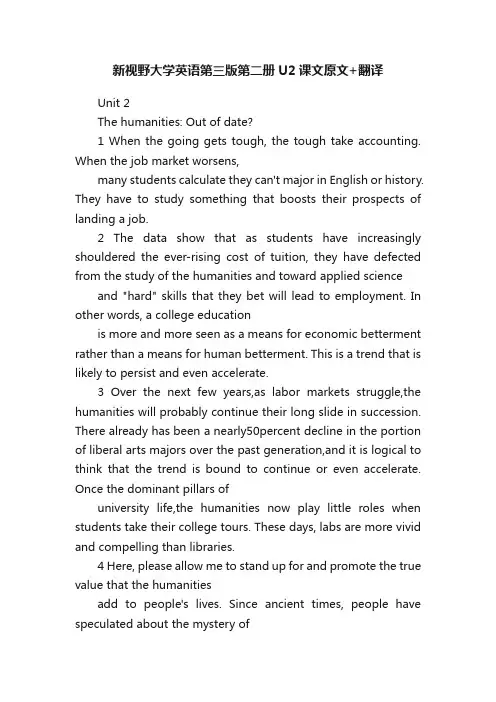
新视野大学英语第三版第二册U2课文原文+翻译Unit 2The humanities: Out of date?1 When the going gets tough, the tough take accounting. When the job market worsens,many students calculate they can't major in English or history. They have to study something that boosts their prospects of landing a job.2 The data show that as students have increasingly shouldered the ever-rising cost of tuition, they have defected from the study of the humanities and toward applied science and "hard" skills that they bet will lead to employment. In other words, a college educationis more and more seen as a means for economic betterment rather than a means for human betterment. This is a trend that is likely to persist and even accelerate.3 Over the next few years,as labor markets struggle,the humanities will probably continue their long slide in succession. There already has been a nearly50percent decline in the portion of liberal arts majors over the past generation,and it is logical to think that the trend is bound to continue or even accelerate. Once the dominant pillars ofuniversity life,the humanities now play little roles when students take their college tours. These days, labs are more vivid and compelling than libraries.4 Here, please allow me to stand up for and promote the true value that the humanitiesadd to people's lives. Since ancient times, people have speculated about the mystery ofthose inner forces that drive some people to greatness and others to self-destruction. Thisinner drive has been called many things over the centuries. The famous psychologist, Sigmund Freud,called it the"unconscious mind"or,more familiarly, "instinct".5 From the beginning of time,this inner aspect of our being,this drive that can be constructive or destructive,has captured our imagination. The stories of this amazing struggle have formed the basis of cultures the world over. Historians, architects, authors, philosophers and artists have captured the words,images and meanings of this inner struggle in the form of story, music, myth, painting, architecture, sculpture, landscape and traditions. These men and women developed artistic "languages" that help us understandthese aspirations and also educate generations. This fertile body of w ork from ancient times, the very foundation of civilization, forms the basis of study of the humanities.6 Studying the humanities improves our ability to read and write. No matter what we do inlife, we will have a huge advantage if we can read complex ideas and understand theirmeaning. We will have a bright career if we are the person in the office who can write aclear and elegant analysis of those ideas!7 Studying the humanities makes us familiar with the language of emotion and the creative process. In an information economy, many people have the ability to produce a useful product such as a new MP3 player. Yet, very few people have the ability to create a spectacular brand:the iPod. Most importantly,studying the humanities invests us with greatinsight and self-awareness, there by releasing our creative energy and talent in a positive and constructive manner.8 Perhaps the best argument in favor of the humanities is the scope of possibilities thatare widely open to us. Did you know that James Cameron, world-famous director of themovie, Titanic ,graduated with a degree in the humanities? So did Sally Ride,the first woman in space. So did actors Bruce Lee, Gwyneth Paltrow, Renee Zellweger and MattDamon. Dr. Harold Varmus,who won a Nobel Prize for Medicine,studied the humanities. Even Michael Eisner,Chairman of the Disney Company, majored in the humanities. Famous people who studied the humanities make a long list indeed. It's easyto see that the humanities can prepare us for many different careers and jobs we can undertake,whether medicine,business,science or entertainment. If we study only mathematics,it's likely we will be a candidate only for jobs as a mathematician. If we include studying the humanities, we can make breakthroughs on many barriers and are limited only by our effort and imagination.9 Of course,nowadays,if we study the humanities alone,we are liable to miss many opportunities. Each one of us needs to become as technically and professionally skilledas possible to help meet the needs of modern life. In fact,increasingly a pairing of technical knowledge and inner insight is seen as the ideal in the establishment of a career. If I were the Dean of Admissions at a medical school and two people applied to our school, both having the required basic scientific courses, one a philosophy major and theother solely a pre-med student, the philosophy applicant would be chosen.10 In summary, the humanities help to create well-rounded human beings with insight and understanding of the passions,hopes and dreams common to all humanity. The humanities, the ancient timeless reservoir of knowledge, teach us to see things differentlyand broaden our horizons. They are as useful and relevant in our modern age as they have always been. Doesn't it make sense to spend some time in the company of the humanities,our outstanding and remarkable treasure of knowledge? Who knows how famous YOU might become!Translation人文学科:过时了吗?1 当形势变得困难时,强者会去选学会计。
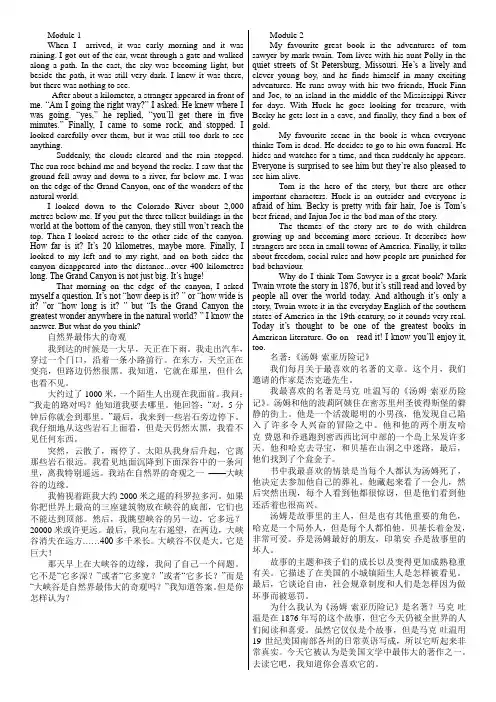
Module 1When I arrived, it was early morning and it was raining. I got out of the car, went through a gate and walked along a path. In the east, the sky was becoming light, but beside the path, it was still very dark. I knew it was there, but there was nothing to see.After about a kilometer, a stranger appeared in front of me. “Am I going the right way?” I asked. He knew where I was going. “yes,” he replied, “you’ll get there in five minutes.” Finally, I came to some rock, and stopped. I looked carefully over them, but it was still too dark to see anything.Suddenly, the clouds cleared and the rain stopped. The sun rose behind me and beyond the rocks. I saw that the ground fell away and down to a river, far below me. I was on the edge of the Grand Canyon, one of the wonders of the natural world.I looked down to the Colorado River about 2,000 metres below me. If you put the three tallest buildings in the world at the bottom of the canyon, they still won’t reach the top. Then I looked across to the other side of the canyon. How far is it? It’s 20 kilometres, maybe more. Finally, I looked to my left and to my right, and on both sides the canyon disappeared into the distance...over 400 kilometres long. The Grand Canyon is not just big. It’s huge!That morning on the edge of the canyon, I asked myself a question. It’s not “how deep is it? ” or “how wide is it? ”or “how long is it? ” but “Is the Grand Canyon the greatest wonder anywhere in the natural world? ” I know the answer. But what do you think?自然界最伟大的奇观我到达的时候是一大早,天正在下雨。
Mike Robinson is a15-year old American boy his sister Claire fourteen years old.迈克鲁滨孙是一一五-岁的美国男孩和他的妹妹克莱尔十四。
At the moment,mike and Clare in Cairo in Egypt,one in Africa's largest and目前,迈克和克莱尔在埃及的开罗,一个在非洲最繁忙busiest cities.最大的城市。
They moved here two years ago,with their parents.Their father,Peter,a very他们两年前搬到这里与他们的父母。
他们的父亲,彼得,一个非常大的公司工作。
large pany has offices in many countries,has sent Peter to work in公司在许多国家有分支机构,已打发彼得工作在Germany,France and China.Peter usually stays in one country for about two德国,法国和中国之前。
彼得通常呆在一个国家大约两年了。
years.The company then move him.His family always.然后公司再移动他。
他的家人总是。
The Robinsons likes to see the world.They went to a lot of interesting places.In鲁宾逊一家人喜欢看世界。
他们去了许多有趣的地方。
例如,在Egypt,for example,they have seen the pyramids,a boat on the Nile,and visited埃及,他们已经看到了金字塔,在尼罗河上的一艘前往,并参观了the palace,the king and queen of the ancient tower.宫殿,古代的国王和王后塔。
Unit 2 课文参考译文Passage 1那晚,我遇见了爱因斯坦杰尔姆·韦德曼【1】那时我还非常年轻,刚刚小有成就,我应邀来到了纽约一位有名的慈善家家中参加晚宴。
餐后,女主人带我们来到了非常宽敞的客厅,其他宾客也随之涌入,然而眼前的两个场景却让我有些紧张不安:一是佣人们正在将镏金的小椅子一排排地摆放得整整齐齐;二是在最前面靠墙倚放着一些乐器。
显而易见,今晚我将经受一场室内音乐会。
【2】之所以用“经受”这个词,是因为我对音乐毫无感觉,几乎就是个乐盲。
即便是特别简单的曲子,我也要费上九牛二虎之力才能跟上调。
对我而言,严肃音乐只不过是排列在一起的噪音。
所以,每当陷入这种困境,我一贯采取的应对方式就是:音乐声响起时,我就在座位上坐定,摆出一副看上去像是很懂欣赏的表情,但在内心却对音乐充耳不闻,而沉浸在与之毫不相关的思绪中。
【3】不一会儿,我意识到身边的人都在鼓掌,所以我想这会儿打开紧闭的耳朵也无妨。
就在这时,一个温和但具有非凡穿透力的声音从我右边传来。
【4】“你喜欢巴赫?”那声音问。
【5】我对巴赫的了解如同我对核裂变的了解一样少。
不过我确实认出了这个人,全世界最赫赫有名的人物之一。
话说这人的形象可是众所周知:头顶一头蓬乱的白发,嘴里总是叼着烟斗。
我竟然坐在艾伯特·爱因斯坦的旁边!【6】“呃,”我回答道,心里忐忑不安,迟疑不决。
我只是被人随口问了一句,也许我只需随口一答。
但是我能从他与众不同的眼神中看出,他问这个问题可不是出于礼貌敷衍一下的。
不论我是否重视我们的交谈,他却是很看重的。
最要命的是,我觉得在这个人面前是没办法撒谎的,哪怕是很小的谎也不行。
【7】“我对巴赫一无所知,”我尴尬地答道。
“而且从没听过他的音乐。
”【8】爱因斯坦那张表情生动的脸上这时露出困惑而又诧异的神色。
【9】“从没听过巴赫的作品?”【10】那语调如此惊讶,好像我刚说的是我从来不曾洗澡一样。
【11】“我不是不想喜欢巴赫”我匆忙回答。
Unit 2The humanities: Out of date?1 When the going gets tough, the tough take accounting. When the job market worsens, many students calculate they can't major in English or history. They have to study something that boosts their prospects of landing a job.2 The data show that as students have increasingly shouldered the ever-rising cost of tuition, they have defected from the study of the humanities and toward applied science and "hard" skills that they bet will lead to employment. In other words, a college education is more and more seen as a means for economic betterment rather than a means for human betterment. This is a trend that is likely to persist and even accelerate.3 Over the next few years, as labor markets struggle, the humanities will probably continue their long slide in succession. There already has been a nearly 50 percent decline in the portion of liberal arts majors over the past generation, and it is logical to think that the trend is bound to continue or even accelerate. Once the dominant pillars of university life, the humanities now play little roles when students take their college tours. These days, labs are more vivid and compelling than libraries.4 Here, please allow me to stand up for and promote the true value that the humanities add to people's lives. Since ancient times, people have speculated about the mystery of those inner forces that drive some people to greatness and others to self-destruction. This inner drive has been called many things over the centuries. The famous psychologist, Sigmund Freud, called it the "unconscious mind" or, more familiarly, "instinct".5 From the beginning of time, this inner aspect of our being, this drive that can be constructive or destructive, has captured our imagination. The stories of this amazing struggle have formed the basis of cultures the world over. Historians, architects, authors, philosophers and artists have captured the words, images and meanings of this inner struggle in the form of story, music, myth, painting, architecture, sculpture, landscape and traditions. These men and women developed artistic "languages" that help us understand these aspirations and also educate generations. This fertile body of work from ancient times, the very foundation of civilization, forms the basis of study of the humanities.6 Studying the humanities improves our ability to read and write. No matter what we do in life, we will have a huge advantage if we can read complex ideas and understand their meaning. We will have a bright career if we are the person in the office who can write a clear and elegant analysis of those ideas!7 Studying the humanities makes us familiar with the language of emotion and the creative process. In an information economy, many people have the ability to produce a useful product such as a new MP3 player. Yet, very few people have the ability to create a spectacular brand: the iPod. Most importantly, studying the humanities invests us with great insight and self-awareness, there by releasing our creative energy and talent in a positive and constructive manner.8 Perhaps the best argument in favor of the humanities is the scope of possibilities that are widely open to us. Did you know that James Cameron, world-famous director of the movie, Titanic, graduated with a degree in the humanities? So did Sally Ride, the first woman in space. So did actors Bruce Lee, Gwyneth Paltrow, Renee Zellweger and Matt Damon. Dr. Harold Varmus, who won a Nobel Prize for Medicine, studied the humanities. Even Michael Eisner, Chairman of the Disney Company, majored in the humanities. Famous people who studied the humanities make a long list indeed. It's easy to see that the humanities can prepare us for many different careers and jobs we can undertake, whether medicine, business, science or entertainment. If we study only mathematics, it's likely we will be a candidate only for jobs as a mathematician. If we include studying the humanities, we can make breakthroughs on many barriers and are limited only by our effort and imagination.9 Of course, nowadays, if we study the humanities alone, we are liable to miss many opportunities. Each one of us needs to become as technically and professionally skilled as possible to help meet the needs of modern life. In fact, increasingly a pairing of technical knowledge and inner insight is seen as the ideal in the establishment of a career. If I were the Dean of Admissions at a medical school and two people applied to our school, both having the required basic scientific courses, one a philosophy major and the other solely a pre-med student, the philosophy applicant would be chosen.10 In summary, the humanities help to create well-rounded human beings with insight and understanding of the passions, hopes and dreams common to all humanity. The humanities, the ancient timeless reservoir of knowledge, teach us to see things differently and broaden our horizons. They are as useful and relevant in our modern age as they have always been. Doesn't it make sense to spend some time in the company of the humanities, our outstanding and remarkable treasure of knowledge? Who knows how famous YOU might become!Translation人文学科:过时了吗?1 当形势变得困难时,强者会去选学会计。
新译林版高中英语选修四U2课文翻译选择性必修四U2ReadingUnit2 Understanding each otherEffective communication 有效沟通If you heard someone shout, "Hey you!" from across the room, how would youreact? Just these two words can carry much information. They could be interpreted as a welcoming greeting from a close friend, especially if accompanied by a gentle smile. When spoken by a stranger, they can function as a means of attracting your attention. Much of what we communicate is dependent not only on the words we use, but also on how we use them. So, let's look a little deeper into the topic of communication.如果你听到有人喊:"嘿,你! ,你会有什么反应?仅仅这两个词就能传达很多信息。
这句话可以被理解为来自亲密朋友的欢迎问候,尤其是伴随着温柔的微笑。
当陌生人和你说话时,它们可以作为一种吸引你注意力的方式。
我们交流的内容不仅取决于我们使用的词语,还取决于我们如何使用它们。
所以,让我们更深入地了解一下沟通这个话题。
Communication is the exchange of information between a sender and a receiver.The sender encodes a message and sends it face to face, or through video, telephone, mail or socialmedia. This message is then received and decoded by the receiver. In response, the receiver sends an encoded message back, which is referred to as feedback. This feedback is decoded by the original sender and the entire cycle repeats itself until they have finished communicating.沟通是发送者和接收者之间的信息交换。
第二单元第一篇阅读全球变暖的原因全球变暖由很多因素引起,其原因可分为两类:人为原因和自然原因。
自然原因自然原因是由自然造成的原因,其中一个自然原因是北极苔原和湿地中释放出的甲烷气体。
甲烷是温室气体的一种,而温室气体是一种能捕获热量并使其保留在地球大气层内的气体。
另一种自然原因是地球要经历一个气候变化的循环周期,这种气候变化通常持续约4万年。
人为原因人为原因可能是全球变暖的罪魁祸首。
人为原因有很多种,污染是最主要的人为原因之一。
污染的种类繁多,范围不同。
燃烧化石燃料是一种导致污染的方式。
化石燃料是由煤或石油等有机物质构成的燃料。
化石燃料燃烧时会释放一种叫二氧化碳的温室气体。
同时,开采煤和石油也会使甲烷逸出。
甲烷是如何逸出的呢?甲烷是存在于地下的,但是开采煤或石油需要进行地面挖掘;挖掘出化石燃料的同时甲烷也随之逸出。
甲烷的另一个来源是动物粪便。
由于人们需要更多的食物,所以要生产食物,而牛等动物是食物的来源之一,这也就意味着会产生更多的粪便和甲烷气体。
二氧化碳会导致全球变暖。
因为人类在呼吸过程中呼出二氧化碳,所以人口的增加必然会加剧全球变暖。
树木能将二氧化碳转化为氧气,但由于人类大面积开发土地,砍伐森林来建造住宅和建筑,树木正遭到严重破坏。
作为生态系统的重要组成部分,树木被大量砍伐,但人们并未及时补种。
我们只是不断地利用自然资源,却并未给予任何回报。
第二篇阅读可再生能源概述似乎许多国家,也包括大多数美国城市,正在认真发起一场寻找最佳替代能源的运动。
《京都条约》的签署正是其体现。
各相关团体和个人的首要目的就是减少温室气体和污染物。
经证明,这些可再生能源有助于减少有毒物质,即能源消耗所产生的副产品。
它们也可以保护人们用做能源的大部分自然资源。
例如,太阳能电池板把阳光转化为能量之后,阳光依然普照而不会影响他用。
哪些是可再生能源中最受欢迎的能源呢?下面的介绍会提供一些基本信息:太阳能—利用强大太阳能已不再是新鲜事儿。
U2:Why Is It So Hard for Men and Women to Talk to Each Other?男女交谈为何如此困难I was addressing a small gathering in a suburban Virginia living room -- a women's group that had invited men to join them. Throughout the evening, one man had been particularly talkative, frequently offering ideas and anecdotes, while his wife sat silently beside him on the couch. Toward the end of the evening, I commented that women frequently complain that their husbands don't talk to them. This man quickly concurred. He gestured toward his wife and said, "She's the talker in our family." The room burst into laughter; the man looked puzzled and hurt. "It's true," he explained. "When I come home from work I have nothing to say. If she didn't keep the conversation going, we'd spend the whole evening in silence."那是在弗吉尼亚郊区一个住所的客厅里,我正在一次小型聚会上发言——这是一次女性的聚会,但也邀请了男性参加。
整晚,一位男士表现得极为健谈,他不断地发表自己的看法,讲述奇闻轶事。
而他的妻子却安静地坐在他身旁的沙发上。
聚会接近尾声时,我说,一些妻子经常抱怨丈夫不与她们交谈,这位男士立刻表示同意。
他指着妻子说:“在家里爱说话的是她。
”于是满屋子哄堂大笑,这位男士一脸茫然和委屈。
“这是真的,”他解释说,“我下班回家后总是无话可说,如果她不说话,我们会整晚沉默。
”This episode crystallizes the irony that although American men tend to talk more than women in public situations, they often talk less at home. And this pattern is wreaking havoc with marriage.这段小插曲反映了一种具有讽刺意味的现象,即美国的男性尽管在公共场合比女性健谈,在家里却比女性说话少。
而正是这一现象使婚姻受到严重威胁。
Sociologist Catherine Kohler Riessman reports in her new book "Divorce Talk" that most of the women she interviewed -- but only a few of the men -- gave lack of communication as the reason for their divorces. 社会学家凯瑟琳•凯尔•里兹曼在她的新作《离婚谈》中说,她采访过的大多数女性将离婚的原因归咎于缺乏交谈,但只有少数男性将此当作离婚的理由。
In my own research, complaints from women about their husbands most often focused not on tangible inequities such as having given up the chance for a career to accompany a husband to his, or doing far more than their share of daily life-support work like cleaning, cooking, social arrangements and errands. Instead, they focused on communication: "He doesn't listen to me," "He doesn't talk to me." I found, as Hacker observed years before, that most wives want their husbands to be, first and foremost, conversational partners, but few husbands share this expectation of their wives.在我本人的研究中,女性对丈夫的抱怨大多不是集中在一些实际的不平等现象,例如为了跟随丈夫的事业而放弃了发展自己事业的机会,或者她们所承担的日常生活琐事远远超过她们份内的部分。
她们的抱怨总是集中在交流问题上,如“他不听我说话”,“他不和我说话”。
我发现多数做妻子的都期望丈夫首先是自己的交谈伙伴。
但是很少有丈夫对妻子抱有同样的期望。
In short, the image that best represents the current crisis is the stereotypical cartoon scene of a man sitting at the breakfast table with a newspaper held up in front of his face, while a woman glares at the back of it, wanting to talk.简言之,最能体现目前这种危机的是一个老套的卡通画面:一个男人坐在早餐桌旁,手中拿着一张报纸看着,而他的妻子愤怒地盯着报纸背面,渴望与他交谈。
Linguistic Battle Between Men and Women两性间的唇枪舌剑How can women and men have such different impressions of communication in marriage?Why is there a widespread imbalance in their interests and expectations? 在婚姻中的交流问题上,为何男女会持有如此不同的观点?为什么男女的兴趣和期望普遍不一致?In the April 1990 issue of American Psychologist, Stanford University's Eleanor Maccoby reports the results of her own and other's research showing that children's development is most influenced by social stucture of peer interactions. Boys and girls tend to play with children of their own gender,and their sex-separate groups have different organizational structures and interactive norms. 斯坦福大学的埃莉诺•麦科比在1990年4月《美国心理学家》刊物上发表了她自己和他人研究的结果。
研究结果表明,儿童的发展主要受同龄伙伴交往过程中社交结构的影响。
无论男孩女孩都喜欢与同性伙伴玩耍。
不同性别的儿童小群体有不同的组织结构和交际准则。
I believe these systematic differences in childhood socialization make talk between women and men like cross-culture communication. My research on men's and women's conversations uncovered patterns similar to those described for children's group.我相信,儿童时代社交过程中的不同规则,导致了两性间的交谈如同跨文化交流一样难。
我本人通过对男女对话的研究发现,成年男女对话的模式类似于儿童群体交流过程中的模式。
For women, as for girls, intimacy is the fabric of relationships, and talk is the thread from which it is woven. little girls creat and maintain friendship by exchanging secrets;similarly,women regard conversation as the cornerstoneof friendship. So a woman expects her husband to be a new and improved version of a best friend. What is important is not the individual subjects that are discussed but the sense of closeness,of a life shared,that emerges when people tell their thoughts,feelings,and impressions. 成年女性同女孩一样,彼此亲密是她们感情关系的纽带。
而交谈是编织这种纽带的线。
小女孩通过相互交换秘密来建立和维持友谊。
同样,成年女性也把交谈看作友谊的基础。